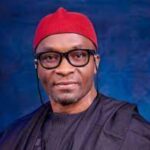By Stella Odueme
The Minister of Power, Chief Adebayo Adelabu has commended the Nigerian for galvanising investment into the Nigerian power sector of the economy via notable pronouncements and acts.
The minister stated this on Tuesday during the Nigerian Electricity Regulatory Commission’s 4th Seminar for Judges with the themed; “Reforms in the Nigerian Electricity Sector Towards Sustainability.”
His words; “The Nigerian judiciary has helped NESI with notable pronouncements and the act of the judiciary goes far in attracting private investment in the power sector.
” In the financial services industry, we say that investments will only follow certainty; and there appears to be no greater means of providing certainty than predictable, clear and logical judicial precedent that is dispensed by a competent bench.”
He said the seminar is a laudable initiative of the Commission towards building the capacity of the Nigerian bench towards achieving the desired objective of predictable, clear and logical judicial precedent in matters affecting the power sector.
According to him, the legal profession has been able to achieve these successes through reforms that were geared towards sustainability; and that these reforms have been consistently developed and deployed over a period of time; and supported with the required resources to achieve results, adding ; “If the Nigerian power sector had received the same consistent reforms supported by required resources, we would have more desirable results in NESI.
” Nigeria has started on the journey towards critical reforms in the power sector towards producing revolutionary results. Prior administrations have contributed immensely in this regard but the legislative changes that have occurred in the past year have placed the sector on the path of a total paradigm shift.
“The notable legislative changes have been the amendment of the Constitution of the Federal Republic of Nigeria with the granting of unfettered powers to sub-nationals to develop electricity markets within their jurisdictions and the Electricity Act 2023 that was assented to by Mr. President in the first month of his administration.
“The Electricity Act 2023introduces far reaching features that propel market liberalisation, extend regulatory reach, and establish a more coherent policy framework that will mitigate of the operational and systemic risks in NESI.
” As we navigate our path towards a more a commercially viable electricity market that is characterised legal and contractual obligations, the imperative to understand the peculiar and nuanced nature of a regulated electricity market becomes even more imperative.
“This seminar is part of the broader vision of the Commission and NJI to engage the members of the judiciary on important developments in the sector. The judiciary’s pivotal role, through notable pronouncements, contributes significantly to attracting private investment in the power sector.”
He stressed the importance of adequate power supply even as he reminded everyone of being a customer to the electricity distribution companies.
“My Lords, may I ask what all of us seated in this auditorium have in common? Some may have rightly pointed out that we are all Nigerians. Some may have pointed out that most of us may be public servants that have been called to serve our great and beloved country, Nigeria, in different capacities/role; but I dare say most of us may have missed the fact that we are all customers of an electricity distribution company and have a deep reliance of their services for the discharge of responsibilities at work and also rely on them for the comfort of our homes.
“I am sure most of us have at one time or the other expressed a deep frustration at power outages and heard the brief shouts of rejoice – Up NEPA – upon restoration of supply.
” It goes without saying therefore that electricity is critical determinant of a modern society and its availability is a key differentiator of success amongst countries, with the leading/1st world countries being able to produce it in abundance as a driver for industrialisation; while the 3rd world countries grapple with making this resource available to meet their development objectives.”



